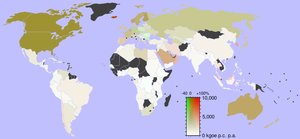| Revision as of 13:31, 7 April 2006 editDbachmann (talk | contribs)227,714 edits example← Previous edit | Revision as of 13:34, 7 April 2006 edit undoDbachmann (talk | contribs)227,714 editsNo edit summaryNext edit → | ||
| Line 1: | Line 1: | ||
| ] | ] | ||
| ] | ] | ||
| '''Over-consumption''' is a concept akin to ], referring to situations where ] ] is so high that even in spite of a moderate ], ] is not acheived. Typically, ]s are suffering from over-consumption while ]s are suffering from overpopulation. For example, the ] has an area comparable to that of the ]. China's population density is 4.7 times higher than that of the USA, but its per capita energy consumption is 9 times lower than that of the USA, so that in spite of its "overpopulation", China uses less than half the |
'''Over-consumption''' is a concept akin to ], referring to situations where ] ] is so high that even in spite of a moderate ], ] is not acheived. Typically, ]s are suffering from over-consumption while ]s are suffering from overpopulation. For example, the ] has an area comparable to that of the ]. China's population density is 4.7 times higher than that of the USA, but its per capita energy consumption is 9 times lower than that of the USA, so that in spite of its "overpopulation", China uses less than half the amount of energy consumed by the USA. | ||
| Over-consumption of ] that derives from the ] of ]s is the main cause of ], and other global ]. | Over-consumption of ] that derives from the ] of ]s is the main cause of ], and other global ]. | ||
Revision as of 13:34, 7 April 2006


Over-consumption is a concept akin to overpopulation, referring to situations where per capita consumption is so high that even in spite of a moderate population density, sustainability is not acheived. Typically, developed nations are suffering from over-consumption while developing nations are suffering from overpopulation. For example, the People's Republic of China has an area comparable to that of the United States of America. China's population density is 4.7 times higher than that of the USA, but its per capita energy consumption is 9 times lower than that of the USA, so that in spite of its "overpopulation", China uses less than half the amount of energy consumed by the USA.
Over-consumption of energy that derives from the combustion of fossil fuels is the main cause of global warming, and other global pollution.
Over-consumption is measurable. Two articles in Physics Today, July 2004, showed that the combination of over-consumption of energy and over-population may have serious consequences for the future of mankind if action is not taken in this generation.
Over-consumption creates an overclass who suffer from affluenza. Excessive unsustainable consumption leads to resource depletion and overshoot. This in turn leads to overpopulation, which is when a species exceeeds its carrying capacity.
The concept was coined to counter rhetorical use of over-population, simplistically referring to population density without taking into accont per-capita consumption, by which developing nations are judged as consuming more than their economy can support.
A key argument, often made by Green parties and the ecology movement, is that consumption per person, or ecological footprint, is lower in poor than in rich nations. Another key argument, often made in the anti-globalisation movement, is that economics itself, particularly that of the commodity markets, is a 'rigged game' by which developed nations loot developing nations of their wealth, including especially their human capital - a process called human capital flight.
See also
- Anti-consumerism
- Conspicuous consumption
- Environmental studies
- Freeganism
- Gluttony
- Green economics
- Malthusian catastrophe
- Post-materialism
- Power conservation
- Sustainable living
- Throw-away society
References
| This article does not cite any sources. Please help improve this article by adding citations to reliable sources. Unsourced material may be challenged and removed. Find sources: "Overconsumption" economics – news · newspapers · books · scholar · JSTOR (Learn how and when to remove this message) |
External links
- United States energy consumption/production profile at NationMaster
- Fifty Possible Ways to Challenge Over-Commercialism by Albert J. Fritsch, SJ, PhD